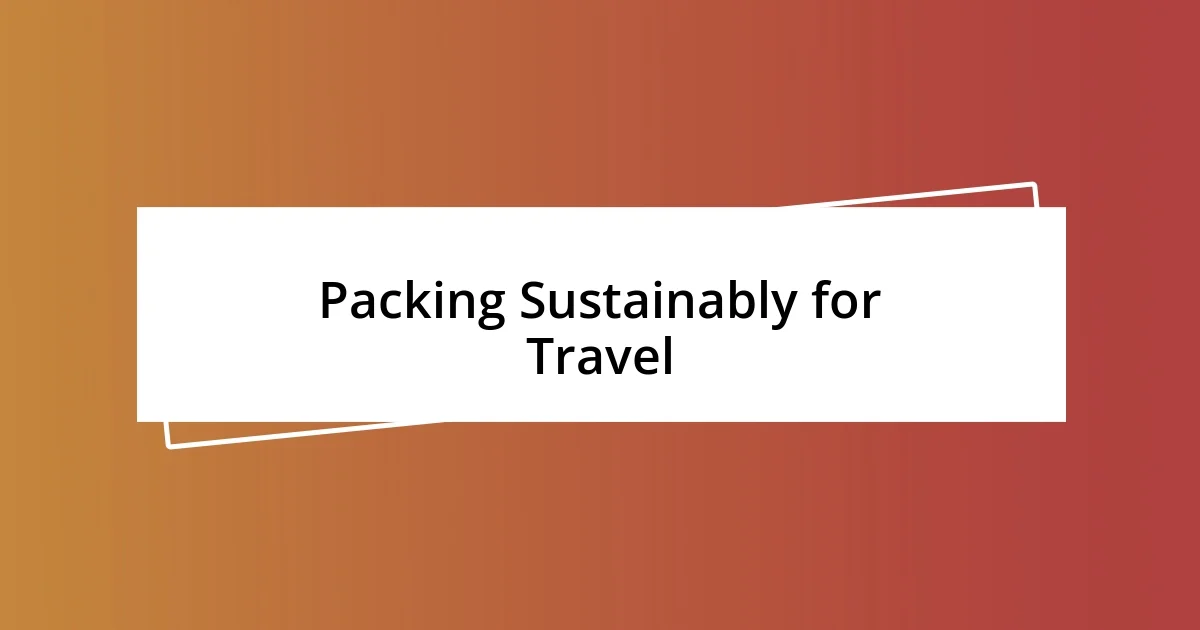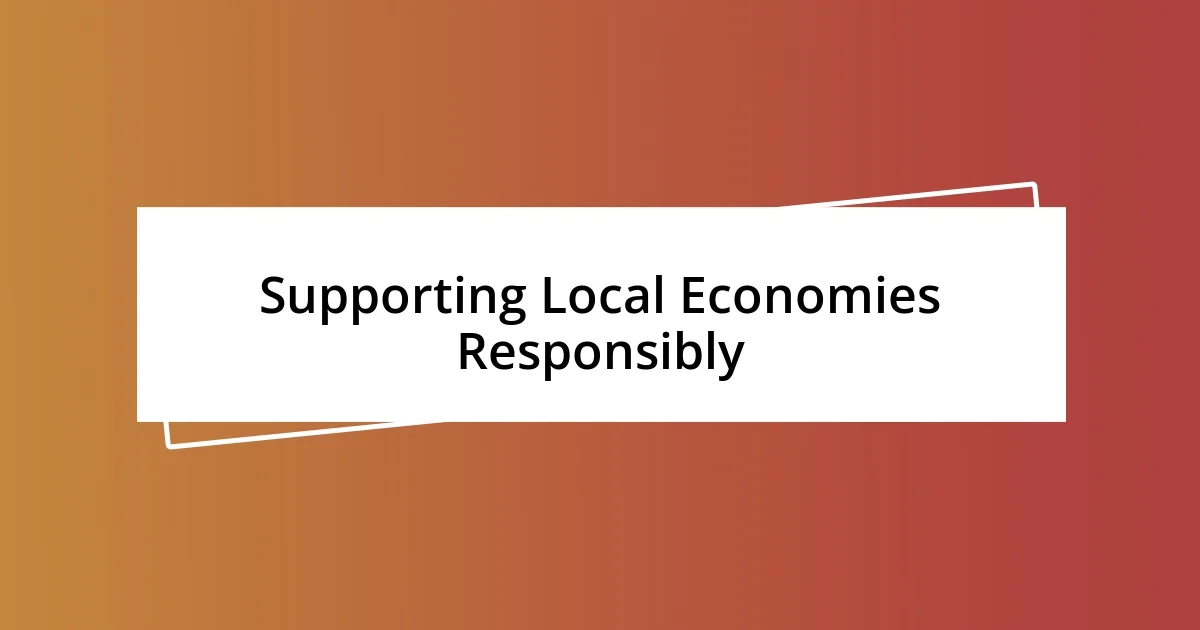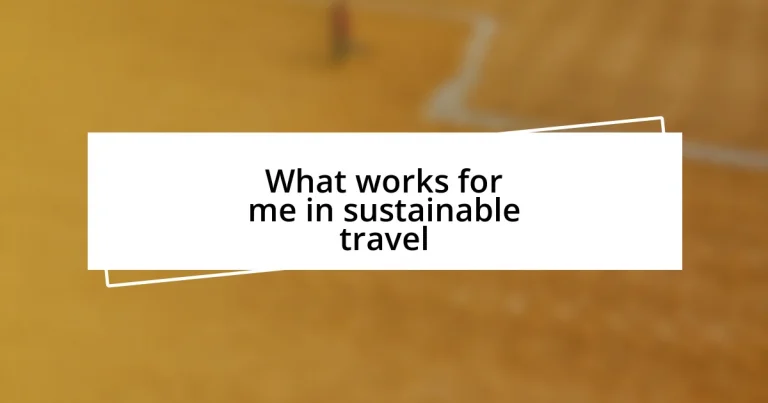Key takeaways:
- Sustainable travel emphasizes minimizing environmental impact and maximizing cultural immersion through eco-friendly choices and community engagement.
- Choosing eco-friendly destinations and green accommodations supports local economies and conservation efforts, enriching the travel experience.
- Opting for sustainable transportation and purchasing handmade local products fosters deeper connections with communities while promoting responsible tourism.

Understanding Sustainable Travel Goals
Sustainable travel goals often revolve around minimizing our environmental impact while maximizing cultural immersion. Have you ever noticed how a local meal feels so much more rewarding than a chain restaurant? That connection to the community not only supports local economies but also creates lasting memories that enrich our travel experience.
As I reflect on my own journey, I remember a hiking trip where every step felt purposeful. Each clean water source we encountered reminded me of the vital ecosystems we walk through. Understanding sustainable travel goals means recognizing these experiences and cherishing the way they align with our values—like the importance of protecting nature for future generations.
I often ask myself, “What kind of footprint do I leave behind?” This thought propels me to choose eco-friendly accommodations and participate in local conservation efforts. It’s not just about exploring; it’s about nurturing the very places we treasure. Sustainable travel invites us to be mindful, opening doors to deeper connections and enriching our adventures profoundly.

Choosing Eco-Friendly Destinations
When selecting eco-friendly destinations, I find it essential to prioritize places that are not only beautiful but also committed to sustainability. On a recent trip to Costa Rica, I discovered towns that heavily focus on conservation efforts. I was amazed by how local businesses worked together to protect the rainforests while offering authentic experiences. It’s these kinds of destinations that leave a lasting impression, both on travelers and the environment.
Here are some key factors I consider when choosing eco-friendly destinations:
- Local Sustainability Initiatives: Look for locations that have strong programs to conserve natural resources and promote renewable energy.
- Wildlife Protection: Choose destinations known for their commitment to protecting native wildlife through reserves or sanctuaries.
- Community Engagement: Opt for places that encourage visitors to interact with local communities, allowing you to learn and contribute positively to their culture.
- Environmental Certifications: Seek accommodations that are certified green or environmentally friendly, ensuring they comply with sustainable practices.
- Natural Reserves and Parks: Favor locations with protected natural areas, as they often prioritize conservation and provide opportunities for eco-tourism activities.

Packing Sustainably for Travel
Packing sustainably for travel has become an art form for me. I focus on bringing items that are multipurpose and durable. For instance, my favorite travel backpack doubles as a daypack and a stylish handbag, significantly reducing the number of bags I need to carry. Have you ever considered the impact of single-use items? By opting for a reusable water bottle and utensils, I cut down on waste while also saving money—not to mention, it feels good to contribute less to landfills.
I’ve realized that what I pack can make a difference beyond just my own convenience. By choosing lightweight, natural fabrics, like organic cotton or bamboo, I not only minimize my carbon footprint during transport but also ensure my clothes are biodegradable. During my recent trip to a wildlife sanctuary, I wore my favorite eco-friendly hoodie every day—it sparked conversations with fellow eco-conscious travelers and created an immediate bond over shared values! It’s these little connections that make travel so memorable.
| Pack Items | First Option | Second Option |
|---|---|---|
| Travel Bags | Multipurpose Backpack | Single-use Plastic Bags |
| Clothing | Organic Cotton Garments | Fast Fashion Items |
| Water Solutions | Reusable Water Bottle | Plastic Water Bottles |
| Utensils | Stainless Steel Set | Disposable Cutlery |
In my quest for sustainable packing, I’ve also explored ethical brands that prioritize environmental responsibility. The thrill of finding a pair of shoes made from recycled materials was a game changer for me. They’re stylish and unique, not to mention the story behind them is inspiring! Every time I slip them on, I feel like I’m making a statement about conscious consumerism; it’s a reminder that my choices matter. Plus, when I wear them at a local café or during a day hike, I enjoy explaining to people how a small change can contribute to a bigger impact. It’s these conversations that resonate with me—they highlight the power we hold as travelers to promote sustainability.

Selecting Green Accommodations
Choosing green accommodations can be a transformative part of my travel experience. I remember staying at a charming eco-lodge in the Amazon, where I was greeted not only by friendly faces but also by the aroma of fresh, locally-sourced meals. It was eye-opening to see how the lodge operated on solar energy, showing me that comfort and sustainability can indeed coexist. Have you ever thought about how your lodging choices impact the local environment and community?
As I filter my options for accommodations, I always look for places with solid environmental certifications. During a trip to a coastal town, I stayed in a hotel certified by the Green Key eco-label. This meant they implemented practices like waste reduction, energy efficiency, and water conservation. I felt good knowing my stay supported a business prioritizing the planet. It created a sense of connection to the place, making my time there even more special.
I also keep an eye on reviews that mention community involvement. On one trip, I found a bed-and-breakfast that employed locals and sourced all its food from nearby farms. It struck me how the owners not only provided an income to the community but also created a unique dining experience filled with local flavors. This trip showed me that green accommodations can foster genuine relationships between travelers and the communities they visit, making the journey even more enriching.

Using Sustainable Transportation Options
Using sustainable transportation options has become a priority for me whenever I travel. I deeply appreciate how public transit not only connects me to local culture but also reduces my environmental impact. On a recent trip to Europe, I hopped on trains and buses instead of renting a car. It was refreshing to sit back, relax, and enjoy the scenery while knowing I was making a greener choice.
When flying is unavoidable, I opt for direct flights whenever possible. This has less environmental impact than connecting flights due to reduced take-offs and landings. I also make a habit of checking the airlines’ sustainability practices. For instance, on one of my flights, I learned that the airline I chose was investing in carbon-offset programs. It genuinely made me feel like my travel choices aligned with my values, creating a sense of responsibility and connection to the world around me.
Cycling is another sustainable transportation option I cherish. Renting a bike in a new city has not only allowed me to explore at my own pace but also creates a unique bond with the environment. I remember pedaling through the streets of Amsterdam, feeling the breeze and discovering hidden gems that I would have missed in a car. It’s invigorating to realize that, with every pedal stroke, I’m contributing to a more sustainable travel experience. Wouldn’t you agree that there’s a certain joy in traveling with purpose?

Supporting Local Economies Responsibly
Supporting local economies responsibly is something I genuinely believe enriches the travel experience. I once visited a small village in Thailand where I participated in a cooking class led by local women. Not only did I learn to prepare traditional dishes, but I also saw firsthand how my participation contributed directly to their livelihoods. Have you ever experienced that warm feeling of knowing your money is supporting families instead of large corporations?
When purchasing souvenirs, I’ve made it a habit to choose handmade items from local artisans rather than mass-produced goods. For instance, in Mexico, I stumbled upon a small market where craftspeople sold beautifully woven textiles. The vendors shared stories about their craft, and I couldn’t help but feel connected to their culture. Isn’t it fulfilling to own something that carries a piece of local history and supports craftsmanship rather than exploitation?
Additionally, I strive to dine at locally-owned restaurants whenever possible. During a visit to a coastal town in Portugal, I tried a family-run seafood place where the owners proudly shared their fishing tales. Eating there wasn’t just a meal; it was an experience that felt authentic and heartfelt. I left with a sense of gratitude for the rich flavors and the vibrant stories behind them. Don’t you think it’s these connections with locals that truly make travel memorable?














